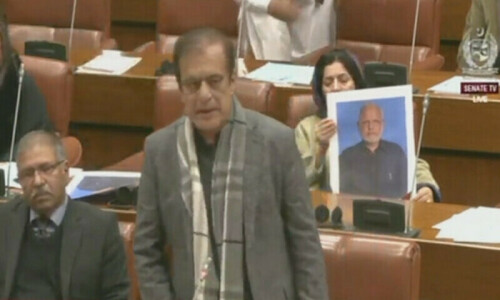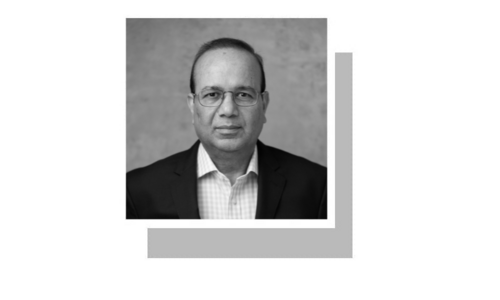LONDON: The United States and Russia failed on Friday to resolve a Cold-War-style crisis sparked by Moscow's military intervention in Crimea and the Ukrainian peninsula's weekend referendum on joining Kremlin rule.
US Secretary of State John Kerry met Russian Foreign Minister Sergei Lavrov in London with few hopes that Sunday's Moscow-backed referendum in the strategic Black Sea peninsula could be averted or delayed.
But US officials said they still expected Moscow to avoid taking the extra step of actually annexing the region of two million mostly Russian speakers in a move that would escalate the biggest East-West showdown since the 1989 fall of the Berlin Wall.
Lavrov however told reporters after more than three hours of talks with Kerry at the lavish US ambassador's residence in central London that Russia and the West were still far apart on Ukraine.
“We have no common vision of the situation,” said Lavrov. “Differences remain.”
Lavrov also said that Moscow “has no, and cannot have, any plans to invade the southeast region of Ukraine” where Russian speakers mostly reside.
But he hinted of Moscow's resolve to put Crimea under its eventual control.
“Everyone understands, and I say this with all responsibility, what Crimea means to Russia, and that it means immeasurably more than the Comoros (archipelago) for France or the Falklands for Britain.”
The Kremlin simultaneously issued a statement saying that President Vladimir Putin had told UN Secretary General Ban Ki-moon that Crimea's decision to conduct the referendum was “in full accordance with the norms of international law and the UN Charter”.
Kerry characterised his talks with Lavrov as “very direct, very frank”.
“Neither we nor the international community will recognise the results of this referendum,” he said, adding that if it takes place, “there will be some sanctions, there will be some response.”
Kerry said that President Barack Obama has already “made it clear that there will be consequences” if Russia failed to take immediate steps to resolve the flaring crisis on the EU's eastern frontier.
“We would like to see actions and not words that (Russia) is diminishing its presence in Ukraine,” the top US diplomat said.
The self-declared pro-Kremlin head of Crimea who initially called the controversial referendum had earlier given Western negotiators some hope by indicating he did not expect Russia to annex his region right away.
“It would take a maximum of one year,” Sergiy Aksyonov told reporters in the Crimean capital of Simferopol.
Kerry said only that he did not expect Putin to make a decision on Crimea until after the referendum.
Ukraine meanwhile remained a tinderbox as more than 8,000 Russian troops staged drills near its eastern border while Nato and US reconnaissance aircraft and fighters patrolled the skies of the ex-Soviet state's EU neighbours to the west.
Kerry has warned Russia that Washington and Europe could announce a “very serious” response as early as Monday if Moscow does not pull back the troops who seized control of Crimea days after the pro-Kremlin regime fell in Kiev last month.
Yet Russia still refuses to recognise the legitimacy of the Western-leaning team that has taken power in Kiev, a move that threatens to shatter Putin's dream of rebuilding a Soviet-type empire.
Deadly violence returned this week to Ukraine for the first time since nearly 90 people were killed in a week of carnage before the fall of the pro-Moscow regime as a pro-Kiev protester was stabbed to death in the mostly Russian-speaking city of Donetsk.
The local health service said a 22-year-old man died and 16 people were wounded in unrest that erupted when pro-Kiev demonstrators were attacked by pro-Moscow protesters.
Ukraine's acting President Oleksandr Turchynov blamed the death on separatists “sent in” from Russia.
“These people and the Kremlin do not care about the lives of those they claim to be protecting,” Turchynov said in a statement.














































Dear visitor, the comments section is undergoing an overhaul and will return soon.